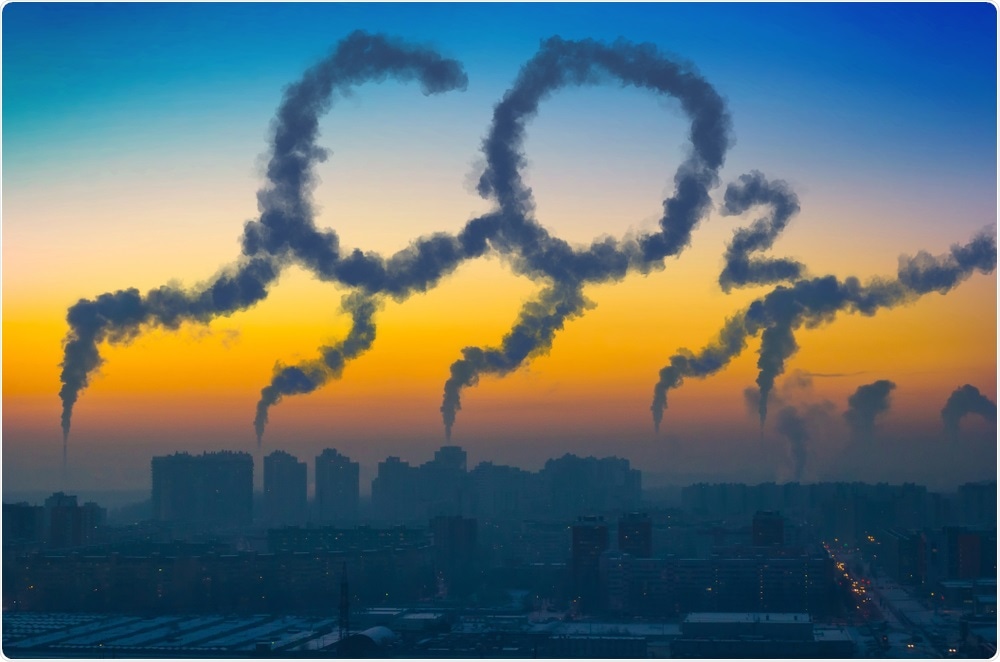Carbon dioxide emissions fell by a record 2.4 billion in 2020, according to researchers at the University of East Anglia (UEA), University of Exeter, and the Global Carbon Project. The government enforced lockdowns around the world as a response to the COVID-19 pandemic are attributed to this significant drop in fossil fuel emissions.

CO2 Emissions. Image Credit: aapsky/Shutterstock.com
Carbon emissions drop, but may bounce back in 2021
The 2015 UN Paris climate agreement set global goals to reduce carbon emissions to protect the planet from the drastic effects of climate change. The targets of the agreement require the world to reduce its emissions by 1 to 2 GtCO2 each year to meet the 2030 deadlines.
This year, scientists have reported a considerable decrease in carbon emissions between 2019 and 2020. It is predicted that there has been a 34 GtCO2 reduction in carbon emissions over the year, representing a 7% drop.
While the data is positive and gives hope that global emissions targets can be met, the researchers stress that it is still too early to estimate to what extent emissions will increase in 2021 as we come out of the pandemic and restrictions and lockdowns ease. It must be kept in mind that while the figures show the possibility of living in a world that relies less on fossil fuels, much of this reduction was due to enforced lockdowns that prevented travel (a significant contributor to carbon emissions) amongst other activities.
Prof Corinne Le Quéré, a Royal Society Research Professor at UEA's School of Environmental Sciences who was involved in this year’s analysis highlighted how the results do not indicate the establishment of sustainable change that will facilitate future emission reductions of such magnitude, “all elements are not yet in place for sustained decreases in global emission, and emissions are slowly edging back to 2019 levels. Government actions to stimulate the economy at the end of the COVID-19 pandemic can also help lower emissions and tackle climate change.”
incentives that help accelerate the deployment of electric cars and renewable energy and support walking and cycling in cities are particularly timely given the extensive disturbance observed in the transport sector this year.”
Global Carbon Budget 2020 - Bucket Animation
Regional differences in carbon emissions
Particular areas around the world showed more marked decreases in carbon emissions during the COVID-19 restrictions. The US saw a 12% drop, and the EU27 countries saw an 11% drop. China saw the smallest reduction in carbon emissions (-1.7%), where the countries rate of rising emissions offset the reduction caused by COVID-19 restrictions.
Additionally, China’s lockdown was over at the beginning of the year, with operations returning to normal far earlier than the rest of the world, demonstrating the potential bounce-back of emissions in 2021.
The UK is projected to have reduced its carbon emissions by 13% over the year, with its second national lockdown restrictions attributed to this significant decrease.
India is projected to have decreased its carbon emissions by 9%. The country’s economic turmoil and a strong reliance on hydropower are believed to have contributed to this drop, with scientists estimating that COVID-19 restrictions had a much smaller impact on reducing these figures.
The data shows that the peak of the decrease in global emissions occurred in the first half of April, at the time when government restrictions and lockdowns were at their most intense, particularly in European countries and in the USA.
Emissions may rise again in 2021
The paper’s lead researcher, Prof Pierre Friedlingstein, stressed that the results should be taken with caution. While carbon emissions of the past year were less than the previous year, 39 billion tonnes of CO2 were still released into the atmosphere.
Continued efforts to reduce emissions to reach zero are vital to protecting the planet from climate change.
Source:
- https://www.uea.ac.uk/news/-/article/covid-lockdown-causes-record-drop-in-co2-emissions-for-2020